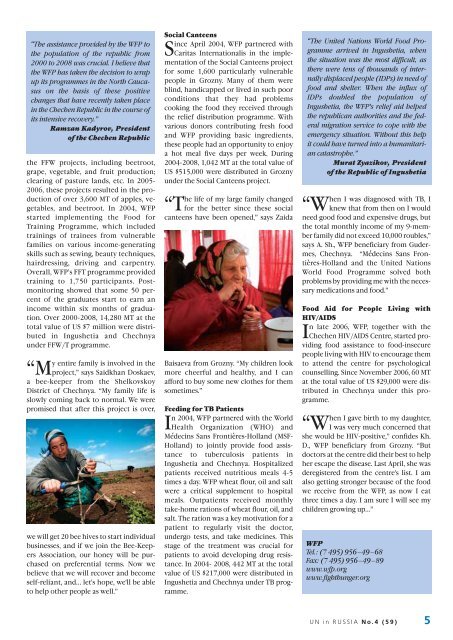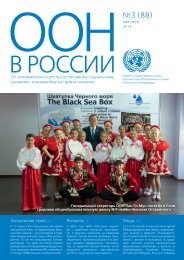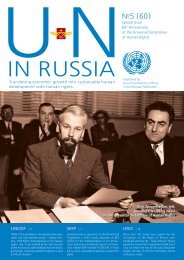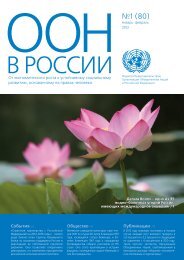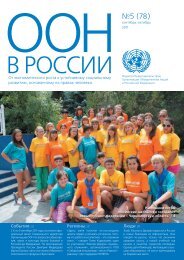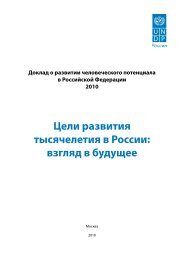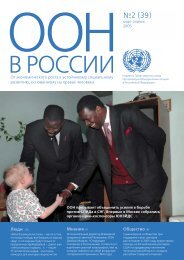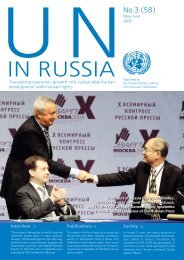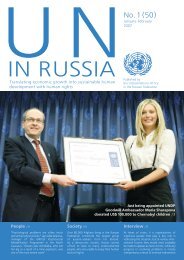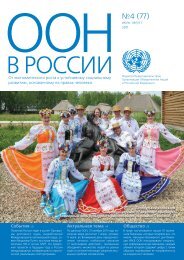Flagship Course: Health System Development - UN Russia
Flagship Course: Health System Development - UN Russia
Flagship Course: Health System Development - UN Russia
Create successful ePaper yourself
Turn your PDF publications into a flip-book with our unique Google optimized e-Paper software.
“The assistance provided by the WFP to<br />
the population of the republic from<br />
2000 to 2008 was crucial. I believe that<br />
the WFP has taken the decision to wrap<br />
up its programmes in the North Caucasus<br />
on the basis of these positive<br />
changes that have recently taken place<br />
in the Chechen Republic in the course of<br />
its intensive recovery.”<br />
Ramzan Kadyrov, President<br />
of the Chechen Republic<br />
the FFW projects, including beetroot,<br />
grape, vegetable, and fruit production;<br />
clearing of pasture lands, etc. In 2005-<br />
2006, these projects resulted in the production<br />
of over 3,600 MT of apples, vegetables,<br />
and beetroot. In 2004, WFP<br />
started implementing the Food for<br />
Training Programme, which included<br />
trainings of trainees from vulnerable<br />
families on various income-generating<br />
skills such as sewing, beauty techniques,<br />
hairdressing, driving and carpentry.<br />
Overall, WFP’s FFT programme provided<br />
training to 1,750 participants. Postmonitoring<br />
showed that some 50 percent<br />
of the graduates start to earn an<br />
income within six months of graduation.<br />
Over 2000-2008, 14,280 MT at the<br />
total value of US $7 million were distributed<br />
in Ingushetia and Chechnya<br />
under FFW/T programme.<br />
y entire family is involved in the<br />
“Mproject,” says Saidkhan Doskaev,<br />
a bee-keeper from the Shelkovskoy<br />
District of Chechnya. “My family life is<br />
slowly coming back to normal. We were<br />
promised that after this project is over,<br />
we will get 20 bee hives to start individual<br />
businesses, and if we join the Bee-Keepers<br />
Association, our honey will be purchased<br />
on preferential terms. Now we<br />
believe that we will recover and become<br />
self-reliant, and… let's hope, we'll be able<br />
to help other people as well.”<br />
Social Canteens<br />
Since April 2004, WFP partnered with<br />
Caritas Internationalis in the implementation<br />
of the Social Canteens project<br />
for some 1,600 particularly vulnerable<br />
people in Grozny. Many of them were<br />
blind, handicapped or lived in such poor<br />
conditions that they had problems<br />
cooking the food they received through<br />
the relief distribution programme. With<br />
various donors contributing fresh food<br />
and WFP providing basic ingredients,<br />
these people had an opportunity to enjoy<br />
a hot meal five days per week. During<br />
2004-2008, 1,042 MT at the total value of<br />
US $515,000 were distributed in Grozny<br />
under the Social Canteens project.<br />
he life of my large family changed<br />
“Tfor the better since these social<br />
canteens have been opened,” says Zaida<br />
Baisaeva from Grozny. “My children look<br />
more cheerful and healthy, and I can<br />
afford to buy some new clothes for them<br />
sometimes.”<br />
Feeding for TB Patients<br />
In 2004, WFP partnered with the World<br />
<strong>Health</strong> Organization (WHO) and<br />
Medecins Sans Frontieres-Holland (MSF-<br />
Holland) to jointly provide food assistance<br />
to tuberculosis patients in<br />
Ingushetia and Chechnya. Hospitalized<br />
patients received nutritious meals 4-5<br />
times a day. WFP wheat flour, oil and salt<br />
were a critical supplement to hospital<br />
meals. Outpatients received monthly<br />
take-home rations of wheat flour, oil, and<br />
salt. The ration was a key motivation for a<br />
patient to regularly visit the doctor,<br />
undergo tests, and take medicines. This<br />
stage of the treatment was crucial for<br />
patients to avoid developing drug resistance.<br />
In 2004- 2008, 442 MT at the total<br />
value of US $217,000 were distributed in<br />
Ingushetia and Chechnya under TB programme.<br />
“The United Nations World Food Programme<br />
arrived in Ingushetia, when<br />
the situation was the most difficult, as<br />
there were tens of thousands of internally<br />
displaced people (IDPs) in need of<br />
food and shelter. When the influx of<br />
IDPs doubled the population of<br />
Ingushetia, the WFP's relief aid helped<br />
the republican authorities and the federal<br />
migration service to cope with the<br />
emergency situation. Without this help<br />
it could have turned into a humanitarian<br />
catastrophe.”<br />
Murat Zyazikov, President<br />
of the Republic of Ingushetia<br />
hen I was diagnosed with TB, I<br />
“Wknew that from then on I would<br />
need good food and expensive drugs, but<br />
the total monthly income of my 9-member<br />
family did not exceed 10,000 roubles,”<br />
says А. Sh., WFP beneficiary from Gudermes,<br />
Chechnya. “Medecins Sans Frontieres-Holland<br />
and the United Nations<br />
World Food Programme solved both<br />
problems by providing me with the necessary<br />
medications and food.”<br />
Food Aid for People Living with<br />
HIV/AIDS<br />
In late 2006, WFP, together with the<br />
Chechen HIV/AIDS Centre, started providing<br />
food assistance to food-insecure<br />
people living with HIV to encourage them<br />
to attend the centre for psychological<br />
counselling. Since November 2006, 60 MT<br />
at the total value of US $29,000 were distributed<br />
in Chechnya under this programme.<br />
hen I gave birth to my daughter,<br />
“WI was very much concerned that<br />
she would be HIV-positive,” confides Kh.<br />
D., WFP beneficiary from Grozny. “But<br />
doctors at the centre did their best to help<br />
her escape the disease. Last April, she was<br />
deregistered from the centre's list. I am<br />
also getting stronger because of the food<br />
we receive from the WFP, as now I eat<br />
three times a day. I am sure I will see my<br />
children growing up…”<br />
WFP<br />
Tel.: (7 495) 956–49–68<br />
Fax: (7 495) 956–49–89<br />
www.wfp.org<br />
www.fighthunger.org<br />
<strong>UN</strong> in RUSSIA No.4 (59) 5


